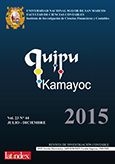KEY PROPOSALS FOR THE NEXT GOVERNMENT: NEITHER MERCANTILIST, NOR POPULIST
DOI:
https://doi.org/10.15381/quipu.v23i44.11637Keywords:
Conflicts of interest, economic groups, public policiesAbstract
The presidential elections will be held next April, and although it expected that a second round will occur, election proposals that defend the current growth model followed by the last three governments (on the basis of the reforms imposed after the coup and dissolution of Congress of April 5, 1992), there is still the possibility that an electoral alternative may arise breaking the status quo in the second round. Therefore is necessary that the presidential candidates (right and left) define their government proposals regarding the following issues: 1) the management of interest conflicts and lobbies, 2) the designation of the principal public officials (operators) and public institutions of the executive power, 3) the business activity of the Government and 4) The reform of the Private Pension System (SPP).
If electoral proposals that represent the status quo pass to the second round, we need that the candidates define their proposals on the first two issues, since the business activity of the Government and reform of the SPP would not be modified. An electoral alternative proposal would change the status quo of these issues. The transparency of the electoral proposals targets the lowering of profiteering and populism cases at the end of the next government (either right or left).
Downloads
Downloads
Published
Issue
Section
License
Copyright (c) 2015 José Salvador Romero Cerna

This work is licensed under a Creative Commons Attribution-NonCommercial-ShareAlike 4.0 International License.
AUTHORS RETAIN THEIR RIGHTS:
a. Authors retain their trade mark rights and patent, and also on any process or procedure described in the article.
b. Authors retain their right to share, copy, distribute, perform and publicly communicate their article (eg, to place their article in an institutional repository or publish it in a book), with an acknowledgment of its initial publication in Quipukamayoc .
c. Authors retain theirs right to make a subsequent publication of their work, to use the article or any part thereof (eg a compilation of his papers, lecture notes, thesis, or a book), always indicating the source of publication (the originator of the work, journal, volume, number and date).






